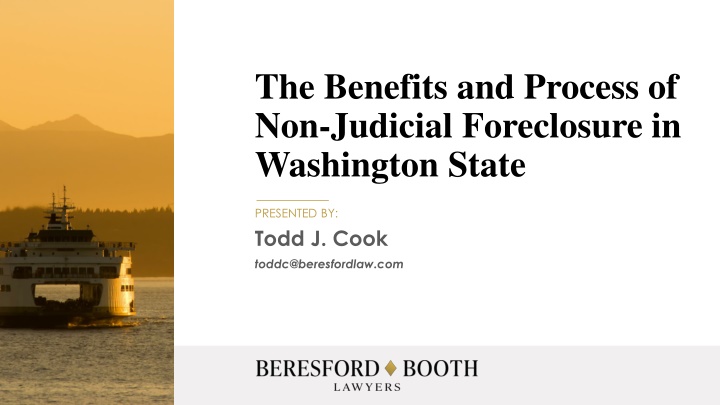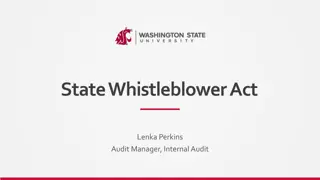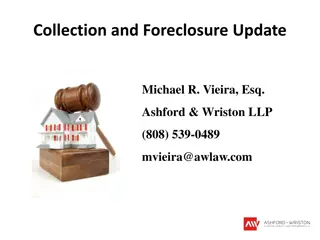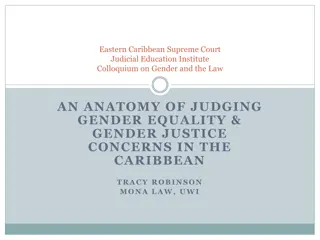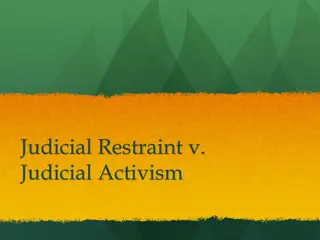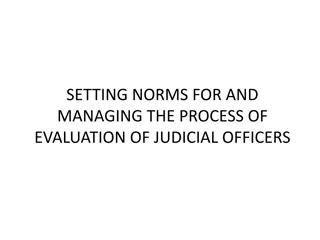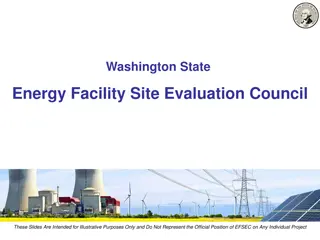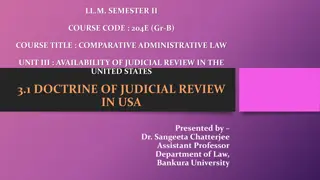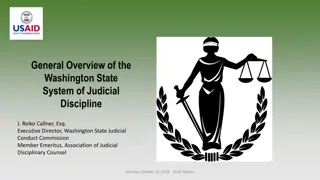Overview of Non-Judicial Foreclosure Process in Washington State
Understanding the benefits and process of non-judicial foreclosure in Washington State, including the definition of foreclosure, two types of foreclosures, the reasons for choosing non-judicial foreclosure, who is eligible for this process, and the steps involved, such as the notice of default and trustee's sale. This overview provides valuable insights into the efficient enforcement of lien rights in real estate.
Download Presentation

Please find below an Image/Link to download the presentation.
The content on the website is provided AS IS for your information and personal use only. It may not be sold, licensed, or shared on other websites without obtaining consent from the author.If you encounter any issues during the download, it is possible that the publisher has removed the file from their server.
You are allowed to download the files provided on this website for personal or commercial use, subject to the condition that they are used lawfully. All files are the property of their respective owners.
The content on the website is provided AS IS for your information and personal use only. It may not be sold, licensed, or shared on other websites without obtaining consent from the author.
E N D
Presentation Transcript
The Benefits and Process of Non-Judicial Foreclosure in Washington State PRESENTED BY: Todd J. Cook toddc@beresfordlaw.com
What is foreclosure? The process by which a secured creditor enforces its lien rights in real estate following the borrower s default of payment obligations under a mortgage agreement.
Two Types of Foreclosures: Judicial Non-Judicial (Trustee s Sale)
Why Non-Judicial Foreclosure? Simple and efficient process outside of court system However, debtor or other lien holders can seek court intervention to stop trustee s sale. See RCW 61.24.130. Finality - no right of redemption following trustee s sale
When is Non-Judicial Process Available? Only for Mortgage s secured by a Deed of Trust that Includes a Power of Sale provision; Confirms the property is not used principally for agricultural purposes ; No pending lawsuit collect under the mortgage All other requisites of trustee s sale satisfies. RCW 61.24.030
Overview of Non-Judicial Foreclosure Process Default of Borrower s payment obligation Trustee provides and publishes Statutory Notices Trustee s Sale on Courthouse Steps Trustee s Deed to Purchaser Sale Proceeds Used to Repay Debt
Step 1: Notice of Default Notice is a Requisite of Trustee s Sale Timing: At least 30 days before Notice of Trustee s Sale First Class & Certified/Registered Mail, plus posted on property in conspicuous place Contents of Notice of Default set by Statute. RCW 61.24.030(8) Additional Statutory Requirements apply for certain residential properties. See RCW 61.24.030(7)(a) & (8).
Step 2: Trustees Sale Guaranty Creditor and Trustee s will want to obtain a Trustee s Sale Guaranty (title policy) May need to clear exceptions from TSG before sale.
Step 3: Notice of Foreclosure & Notice of Trustee s Sale Notice of Trustee s Sale delivered and recorded at least 90 days before Sale. RCW 61.24.040(2). Publish Notice of Sale to legal newspaper in County where property is located. RCW 61.24.040(5). Notice of Foreclosure explaining right to reinstate mortgage up to 11 days before Trustee s Sale and amounts necessary to reinstate. RCW 61.24.040(4).
Step 4: Cry the Sale Trustee (or trustee s agent) conducts the sale at the time and place set forth in the Notice of Sale: Typically conducted at steps of county courthouse on a Friday morning Before conducting sale, check Bankruptcy dockets to ensure no automatic stay is in place. Trustee sets bid opening bid amount and bid procedures. Creditor can credit bid up to outstanding loan amount.
Step 5: Trustees Deed and REETA Following sale, the Trustee issues a Trustee s Deed to the winning bidder Similar to a Bargain and Sale Deed Trustee does not enter warranties associated with a Statutory Warranty Deed Trustee files a Real Estate Tax Affidavit The real estate excise tax does not apply to the foreclosure sale of real property by the trustee under the terms of a deed of trust, whether to the beneficiary listed on that deed or to a third party. WAC 458-61A-208(3).
Step 6: Sale Proceeds Order of distribution of proceeds set by RCW 61.24.080: First, for expense of sale; Second, to satisfy the obligation secured by the deed of trust; Third, surplus deposited with the clerk of the superior court for the county where property is located Notices required to interested parties; Motions practice by interested parties determines manner of distribution. If sale proceeds do not satisfy mortgage, creditor can seek deficiency judgment against guarantors of loan. But if purchased via credit bid, can only seek deficiency above fair value of the property.
To Summarize Quick and efficient process outside of court system. No right of redemption leads following the trustee s sale Must comply with all statutory notices to debtor and other lenders Public sale held by trustee
Questions? Todd J. Cook toddc@beresfordlaw.com 425.776.4100
